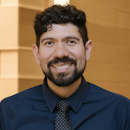Can Aging be Reversed in the Brain?
- Speaker
-
 Saul Villeda, Ph.D.Assistant Professor, Department of Anatomy; Associate Director, Bakar Aging Research Institute, University of California, San Francisco
Saul Villeda, Ph.D.Assistant Professor, Department of Anatomy; Associate Director, Bakar Aging Research Institute, University of California, San Francisco
Presidential Lectures are free public colloquia centered on four main themes: Biology, Physics, Mathematics and Computer Science, and Neuroscience and Autism Science. These curated, high-level scientific talks feature leading scientists and mathematicians and are intended to foster discourse and drive discovery among the broader NYC-area research community. We invite those interested in the topic to join us for this weekly lecture series.
Aging drives cognitive impairments in the adult brain. It is imperative to gain insight into what drives aging phenotypes in the brain to maintain and even restore functional integrity in the elderly.
In this lecture, Saul Villeda will talk about how he and others have shown that systemic manipulations — such as heterochronic parabiosis (in which a young and old circulatory system are joined) and administration of young blood plasma — can reverse age-related impairments in regenerative and synaptic processes. Such manipulations can also rescue cognitive faculties in the aged brain. More recently, his lab demonstrated that administration of exercise-induced blood factors can likewise partially reverse age-related loss of plasticity in the aged brain. Consequently, scientists can now consider reactivating latent plasticity dormant in the aged brain to rejuvenate regenerative, synaptic and cognitive functions late in life. His research program aims to elucidate cellular and molecular mechanisms that can be targeted to halt the aging process or promote rejuvenation in the old brain. Understanding how to reverse aging in the brain could enable us to sidestep the effects of aging that promote vulnerability to neurodegenerative diseases altogether, providing a unique therapeutic approach.
Registration is required for this free event.
Further instructions and access to join the webinar will be sent to all registrants upon sign up.
